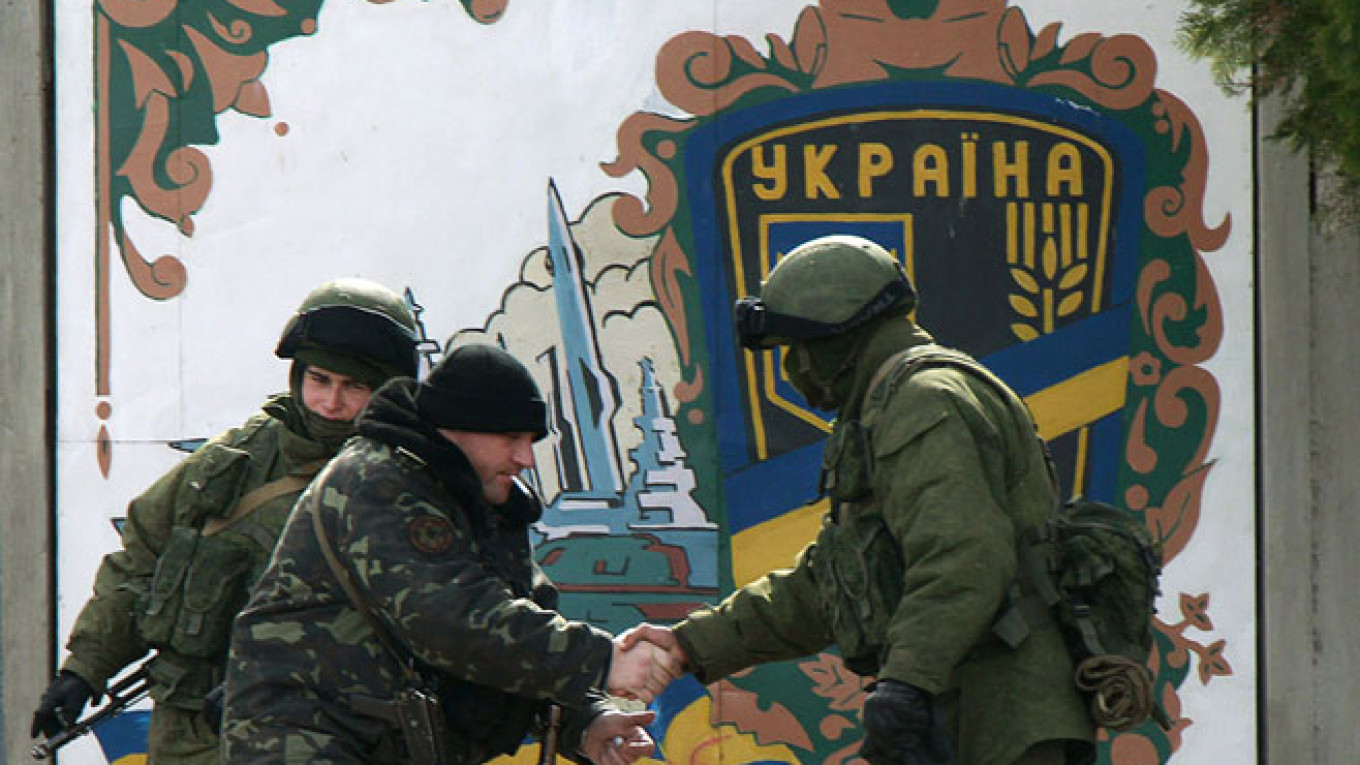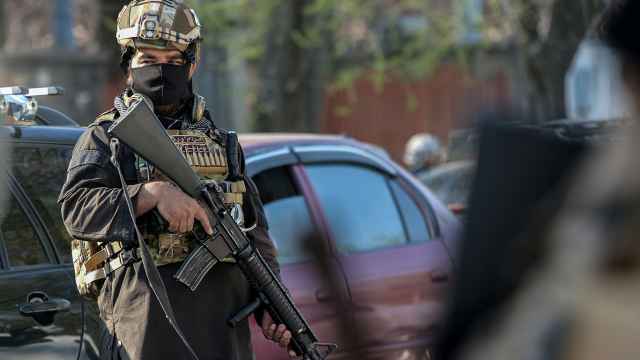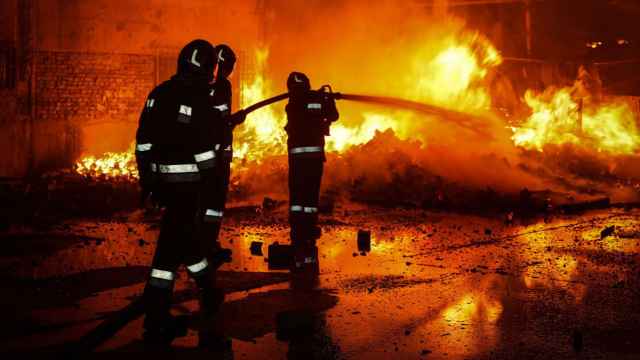Russian Foreign Minister Sergei Lavrov told President Vladimir Putin on Monday that Russia and the West were continuing to butt heads over the Ukraine situation after the U.S. submitted "unsatisfactory" proposals based on the notion that there was a "conflict between Russia and Ukraine."
At a meeting with Putin in Sochi, Lavrov also said U.S. Secretary of State John Kerry had declined a visit to Russia to discuss the Ukraine crisis, which has become increasingly tense after Crimea was occupied by armed forces widely believed to be Russian.
Lavrov's comments come after Western leaders promised a second set of sanctions against Russia if it did not change its position on the issue. The first set of sanctions was imposed after Russia refused to withdraw the troops in Crimea, which the Kremlin says are not Russian but local self-defense units.
Last week, the republic's parliament set a referendum for March 16 on seceding from Ukraine and joining Russia. The referendum has been condemned as illegal by Western leaders, some of whom have accused the Kremlin of orchestrating it.
Russia's actions have been harshly criticized by the West, though some analysts have argued that the U.S. and the European Union had failed to do enough to support Ukraine. Analysts have argued that the Kremlin's involvement in Crimea could even cause concerns among its allies, including some former Soviet countries and China.
On Monday, Lavrov sought to allay foreigners' concerns, however, saying that Russia had a solution to the crisis.
"We prepared our own proposals aimed at returning the situation into the framework of international law, to honor the interests of all Ukrainians, given the deep governmental crisis in Ukraine," Lavrov said, Reuters reported.
Last week the U.S. announced that it would impose visa restrictions and asset freezes on Russian officials linked to the occupation of Crimea, while the EU said it would suspend visa talks with Moscow and its attendance of the upcoming Group of Eight summit in Sochi in June.
On Sunday, U.S. Deputy National Security Adviser Tony Blinken said that the U.S. would also introduce additional sanctions against Russia if it annexed Crimea. His comments were echoed by German Foreign Minister Frank-Walter Steinmeier, who said Sunday that the EU could introduce a new set of sanctions if Russia did not change its position within several days.
Putin defended Russia's position during a telephone conversation with German Chancellor Angela Merkel and British Prime Minister David Cameron on Sunday, arguing that the planned referendum was legitimate.
"Putin underlined in particular that the steps taken by Crimea's legitimate authorities are based on international law and aimed at guaranteeing the legitimate interests of the peninsula's population," the Kremlin said in a statement.
"The Russian president also drew the attention of his interlocutors to the lack of any action by the present authorities in Kiev to limit the rampant behavior of ultranationalists and radical forces in the capital and in many regions," the statement said.
Merkel told Putin that the referendum was at odds with Ukraine's constitution and international law, the German government said in a statement.
But both sides expressed interest in the "de-escalation of tensions" in Ukraine.
In another effort to resolve the Crimean crisis, U.S. President Barack Obama called Chinese President Xi Jinping on Monday.
The two leaders agreed on the "importance of upholding principles of sovereignty and territorial integrity, both in the context of Ukraine and also for the broader functioning of the international system," the White House said in a statement.
As the situation in Ukraine escalated, U.S., Romanian and Bulgarian naval forces were set to begin military drills in the Black Sea on Tuesday, though Bulgaria's Defense Ministry denied that they were linked to the Ukrainian crisis, Itar-Tass reported.
Despite Western countries' criticism of Russia, some analysts have said the West's reaction was not sufficient to resolve the crisis.
"The reaction of Western countries has so far been milder than I expected," said Alexei Malashenko, an analyst at the Moscow Carnegie Center.
Europe is split over the Crimean crisis and Putin will use that in his political combinations, he added.
Andrei Illarionov, a former Putin aide and a research fellow at the U.S.-based Cato Institute, went even further, saying that Western countries have effectively approved Russia's annexation of Crimea by not taking action. He compared their response to the Crimea crisis to the 1938 Munich agreement, which was aimed at appeasing Nazi Germany.
"[U.S. President Barack] Obama has given in to Putin and given him the green light to the annexation of Crimea, destabilization and subsequent conquest of eastern and southern Ukraine and the overthrow of the current government in Kiev," Illarionov wrote on his blog on Friday.
As proof for his theory, Illarionov cited the supposedly mild language used by Obama during a telephone conversation with Putin late last week.
During the phone call, Obama "emphasized that Russia's actions are in violation of Ukraine's sovereignty and territorial integrity" but said that "there is a way to resolve the situation diplomatically, which addresses the interests of Russia, the people of Ukraine and the international community," the White House said in a transcript posted on its website.
Apart from irritating the West, Russia's actions in Crimea might also prompt some of its closest allies to reconsider their relations with the Kremlin.
Malashenko said that Belarus, which is mostly Russian-speaking, and Kazakhstan, where there is a large Russian minority, have been shocked by Russia's involvement in Crimea. They had expected economic integration with Russia but not "the resurrection of the Soviet Union," he said.
Moreover, Turkey, which used to rule Crimea and has close links to the Crimean Tatar minority, is likely to "play the Crimean card," while China is also wary of Russia's actions, Malashenko said.
As the situation in Crimea became the focus of high-level international talks, Russia continued to strengthen control over the peninsula and seized some Ukrainian military facilities last week. Troops identified by Ukraine as Russian even ventured outside Crimea's territory into the nearby Kherson region on Saturday and blocked a road between the region and Crimea, Liga.net reported.
On Monday, armed men opened fire during their takeover of a Ukrainian naval post near Bakhchisarai, Interfax reported, adding that no one had been hurt.
Numerous reports have also been published recently of Ukrainian journalists and pro-Kiev activists being beaten or kidnapped in Crimea.
An unknown group of people beat up journalists, including Anton Loktionov from Ukraine and Pavel Nikulin from Russia, during the seizure of a Ukrainian military unit near Sevastopol on Friday, Radio Liberty reported.
On Sunday, the Prosecutor General's Office of Ukraine said that it had opened an investigation into the kidnapping of pro-Kiev activists Andrei Shchekun and Andrei Kovalsky in Crimea. On the same day, Euromaidan activists Katerina Butko and Oleksandra Ryazantseva and Ukrainian journalist Olena Maksimenko were kidnapped by unknown people on the border between Crimea and the Kherson region, Ukrainskaya Pravda reported.
In a similar case, the Ukrainian Republican Party said Monday that one of its activists, Igor Kiryushchenko, had been kidnapped on the peninsula.
Contact the author at o.sukhov@imedia.ru
A Message from The Moscow Times:
Dear readers,
We are facing unprecedented challenges. Russia's Prosecutor General's Office has designated The Moscow Times as an "undesirable" organization, criminalizing our work and putting our staff at risk of prosecution. This follows our earlier unjust labeling as a "foreign agent."
These actions are direct attempts to silence independent journalism in Russia. The authorities claim our work "discredits the decisions of the Russian leadership." We see things differently: we strive to provide accurate, unbiased reporting on Russia.
We, the journalists of The Moscow Times, refuse to be silenced. But to continue our work, we need your help.
Your support, no matter how small, makes a world of difference. If you can, please support us monthly starting from just $2. It's quick to set up, and every contribution makes a significant impact.
By supporting The Moscow Times, you're defending open, independent journalism in the face of repression. Thank you for standing with us.
Remind me later.






